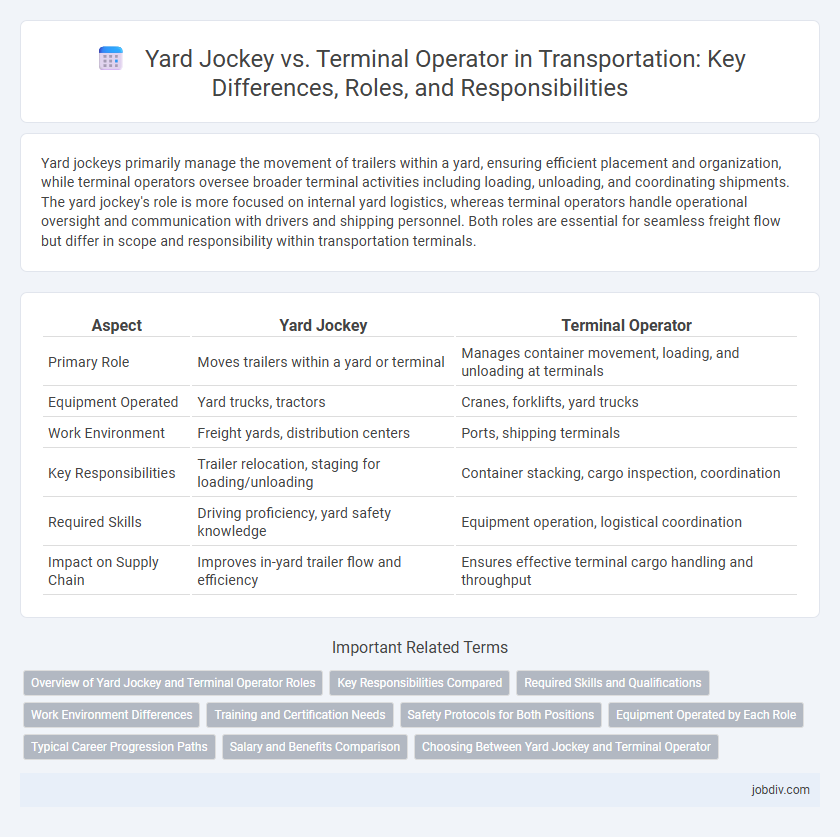Yard jockeys primarily manage the movement of trailers within a yard, ensuring efficient placement and organization, while terminal operators oversee broader terminal activities including loading, unloading, and coordinating shipments. The yard jockey's role is more focused on internal yard logistics, whereas terminal operators handle operational oversight and communication with drivers and shipping personnel. Both roles are essential for seamless freight flow but differ in scope and responsibility within transportation terminals.
Table of Comparison
| Aspect | Yard Jockey | Terminal Operator |
|---|---|---|
| Primary Role | Moves trailers within a yard or terminal | Manages container movement, loading, and unloading at terminals |
| Equipment Operated | Yard trucks, tractors | Cranes, forklifts, yard trucks |
| Work Environment | Freight yards, distribution centers | Ports, shipping terminals |
| Key Responsibilities | Trailer relocation, staging for loading/unloading | Container stacking, cargo inspection, coordination |
| Required Skills | Driving proficiency, yard safety knowledge | Equipment operation, logistical coordination |
| Impact on Supply Chain | Improves in-yard trailer flow and efficiency | Ensures effective terminal cargo handling and throughput |
Overview of Yard Jockey and Terminal Operator Roles
Yard jockeys are responsible for moving trailers within a shipping yard, positioning containers for loading and unloading, and ensuring efficient trailer organization. Terminal operators manage the overall operations of a freight terminal, coordinating shipping schedules, supervising yard jockeys, and maintaining safety compliance. Both roles are critical for optimizing container handling, reducing shipment delays, and supporting supply chain efficiency.
Key Responsibilities Compared
Yard jockeys primarily manage the movement of trailers within a shipping yard, ensuring efficient placement and organization to streamline loading and unloading processes, while terminal operators oversee broader terminal activities, including cargo handling, equipment maintenance, and coordination of shipments. Yard jockeys operate yard tractors to reposition trailers safely and quickly, whereas terminal operators are responsible for managing terminal operations, staff, and adherence to safety regulations. The key difference lies in the scope of responsibilities: yard jockeys focus on precise trailer movement within the yard, whereas terminal operators handle comprehensive terminal logistics and operational management.
Required Skills and Qualifications
Yard jockeys require strong forklift operation skills, spatial awareness, and valid commercial driver's licenses to efficiently maneuver trailers within the yard. Terminal operators need expertise in logistics coordination, inventory management systems, and experience with heavy equipment such as cranes and straddle carriers. Both roles demand safety training certifications and the ability to operate under fast-paced, deadline-driven environments.
Work Environment Differences
Yard jockeys operate primarily within yard areas, maneuvering trailers between docks and parking spaces, often exposed to variable weather conditions and requiring constant physical activity. Terminal operators work inside terminal facilities, coordinating shipping and receiving processes, usually in controlled environments with heavy use of computerized systems. The distinct environments impact job demands, where yard jockeys face more outdoor hazards and mobility challenges, while terminal operators emphasize precision and logistics management indoors.
Training and Certification Needs
Yard jockeys require specialized training in safe vehicle maneuvering, trailer spotting, and internal yard traffic management, often combined with certification in commercial vehicle operation and safety protocols. Terminal operators need comprehensive certification covering cargo handling, equipment operation, and regulatory compliance to manage terminal workflow efficiently and ensure workplace safety. Both roles demand ongoing training to adapt to evolving industry standards and technological advancements in transportation logistics.
Safety Protocols for Both Positions
Yard jockeys follow strict safety protocols including constant communication with terminal operators and adherence to speed limits within the yard to prevent accidents while moving trailers. Terminal operators implement rigorous inspection routines and maintain clear signaling systems to ensure safe loading, unloading, and stacking of containers. Both positions require personal protective equipment (PPE) compliance and regular safety training to reduce risks in high-traffic terminal environments.
Equipment Operated by Each Role
A Yard Jockey primarily operates yard tractors and terminal tractors to move trailers within the shipping yard, optimizing trailer placement and minimizing dock delays. Terminal Operators handle a broader range of heavy machinery, including cranes, forklifts, and reach stackers, to load, unload, and stack containers efficiently. Understanding the specific equipment each role handles highlights their critical functions in maintaining seamless logistics and yard operations.
Typical Career Progression Paths
Yard jockeys typically start their careers by gaining experience in operating yard trucks and managing container movement within shipping yards, progressing to terminal operator roles where they oversee broader logistics operations and coordinate shipments. Terminal operators often advance by developing skills in facility management, safety compliance, and customer relations, which can lead to supervisory or managerial positions within transportation hubs. Career progression in this sector is driven by operational expertise and leadership capabilities, with opportunities expanding as professionals move from hands-on roles to strategic planning and coordination.
Salary and Benefits Comparison
Yard jockeys typically earn an hourly wage ranging from $15 to $25, with benefits including health insurance, retirement plans, and overtime pay, reflecting their role in moving trailers within a terminal. Terminal operators tend to receive higher salaries, often between $50,000 and $75,000 annually, accompanied by comprehensive benefits such as paid time off, health coverage, and performance bonuses due to their responsibility for overseeing terminal operations. Salary differences are influenced by job scope, experience, and union representation, impacting the overall compensation and benefits packages in transportation logistics.
Choosing Between Yard Jockey and Terminal Operator
Choosing between a yard jockey and a terminal operator depends on the specific transportation facility needs and operational complexity. Yard jockeys primarily handle short-distance trailer movements within rail yards or distribution centers, optimizing trailer positioning and reducing terminal congestion. Terminal operators manage broader responsibilities including coordination of loading/unloading, inspection, and documentation, making them essential for efficient terminal throughput and compliance.
Yard Jockey vs Terminal Operator Infographic

 jobdiv.com
jobdiv.com